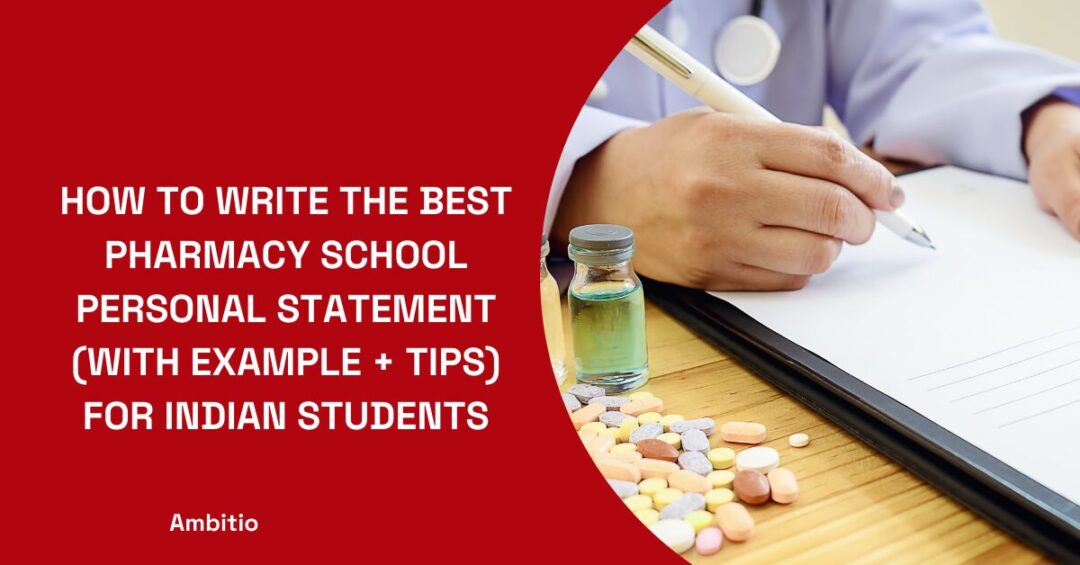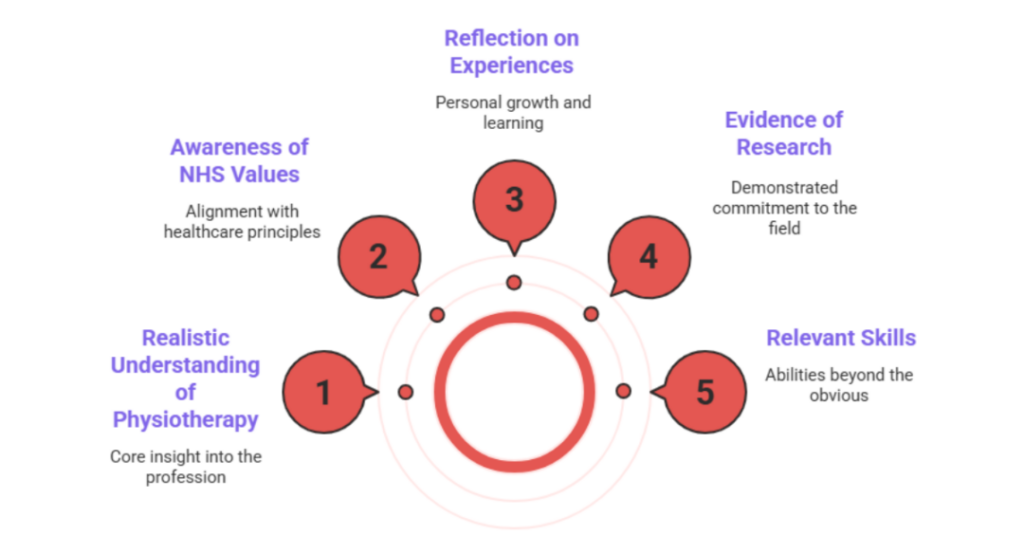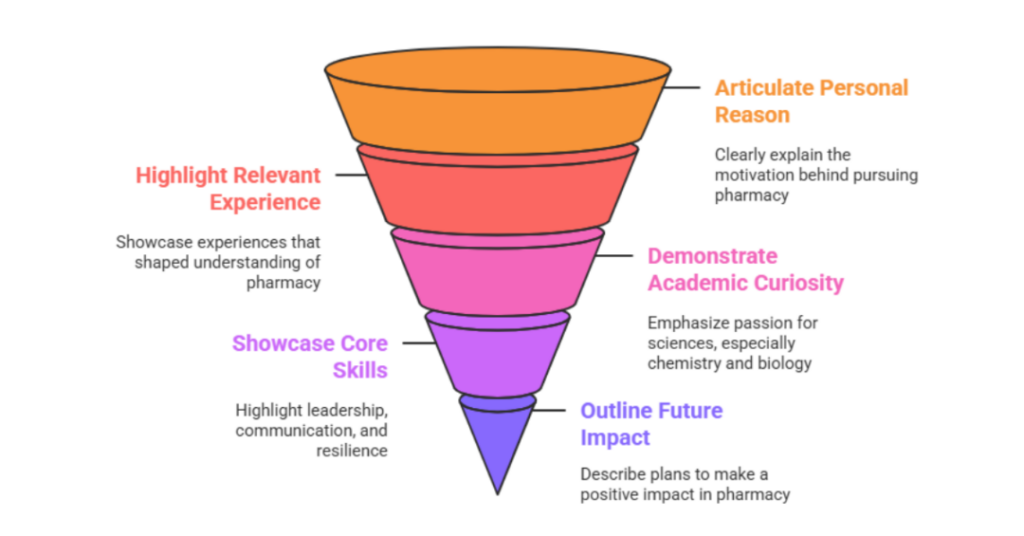26 May 2025
7 minutes read
How To Write The Best Pharmacy School Personal Statement (With Example + Tips) For Indian Students

Key Takeaways
- Nail your pharmacy school personal statement by telling a sharp, specific story that proves you’re ready for the profession.
- Study pharmacy in 2025 to join a fast-growing, tech-augmented field where real human judgment still leads.
- Back your application with real-world experience, strong science interest, and a clear reason for choosing this path.
Around 65% of pharmacy school applicants get rejected—and not because they lack qualifications, but because their pharmacy personal statement reads like a recycled template. Let’s be honest: saying you “want to study pharmacology” or “pursue a career in pharmacy” isn’t enough. Admissions teams want to know why you want to become a pharmacist, what work experience you’ve gained at a local pharmacy, how volunteering or shadowing a pharmacist shaped your interest in pharmacy, and why you’re a good fit for their program.
If your pharmacy school personal statement doesn’t tailor your story with sharp attention to detail, teamwork, and real passion—it won’t stand out. In this guide, I break it down for you with a real personal statement example and smart strategies that get applicants admitted.
Why Should You Study Pharmacy In 2025?
Pharmacy in 2025 isn’t just about counting pills behind a glass window—it’s about standing at the center of the healthcare revolution while everyone else plays catch-up. Think AI can replace pharmacists? Not quite. While tech’s getting smarter, pharmaceutical knowledge, patient trust, and critical thinking can’t be automated (at least not yet).

Here’s why studying pharmacy in 2025 is a smart, strategic, and slightly rebellious move:
1. Pharmacists Are Becoming Frontline Decision-Makers
In the post-pandemic world, pharmacists aren’t just assistants—they’re advisors, educators, and gatekeepers of public health. With prescriptive authority expanding and pharmaceutical care becoming more patient-centered, you’ll be making calls that genuinely impact lives. You’re not just part of the system—you run part of it.
2. Drug Innovation Is Exploding—and Pharmacists Are Involved Early
Thanks to mRNA, CRISPR, and next-gen biologics, we’re in a golden era of drug development. But here’s what most don’t realize: pharmacists now work directly with research teams, clinical trials, and regulatory planning. If you love science and impact, this is the backstage pass to the pharmaceutical industry you didn’t know existed.
3. AI Is Here—But It Needs You
Sure, AI can process data. But can it explain why you want to take a certain drug over another based on a patient’s lifestyle, comorbidities, or even personal fears? Not a chance. Human pharmacists are now essential in interpreting AI-generated suggestions and turning them into real, personalized decisions. In 2025, it’s not man vs. machine—it’s man with machine.
4. Job Security Meets Global Demand
While some industries are sweating over layoffs, pharmacy jobs are climbing globally. With aging populations and chronic diseases spiking, pharmaceutical professionals are needed everywhere—from hospitals in Tokyo to clinics in rural Texas. This isn’t a “might-hire-you” field. It’s a “we-need-you-now” situation.
5. It’s a Career With Authority—And Humanity
You won’t just be answering phones or pushing paper. You’ll be counseling patients, managing therapies, and solving problems on the ground. You’ll need empathy, sharp judgment, and rock-solid ethics. If you’re trying to explain why you want a career that blends science with soul—pharmacy checks every box.
What To Include In Your Pharmacy Personal Statement?
Your pharmacy personal statement is not a diary entry or a flex resume. It’s your pitch—why you belong in pharmacy school and what makes you worth their seat. Yet, most applicants either overdo it (cue dramatic childhood illness story) or underdeliver (cue dry bullet points about “teamwork”).

Here’s what actually needs to go in if you want to stand out:
1. A Clear, Personal Reason Behind Your Decision to Pursue Pharmacy
Admissions officers want to understand your decision to pursue pharmacy—what sparked it, and how that spark turned into real commitment. Maybe it started with volunteering at a local pharmacy, helping your community, or watching healthcare professionals support someone you care about. Whatever it is, make it specific. Show them this isn’t just a whim—it’s your path to becoming a pharmacist.
2. Relevant Experience That Shaped Your Understanding of the Field
Whether it’s working as a community pharmacist, shadowing, interning with pharmaceutical companies, or gaining experience in the healthcare system—your exposure matters. But don’t just list where you’ve been. Reflect on what you learned. How did it shape your view of prescriptions and dispense work, good customer service, or the impact pharmacists have on real lives?
3. Your Academic Curiosity, Especially in Chemistry and Biology
Pharmacy programs expect you to thrive in the sciences. So if you have a passion for chemistry, loved studying pharmacology, or dove deep into biology concepts outside class—talk about that. This is not just about grades, but proving your intellectual readiness for a rigorous degree in pharmacy. Make them believe you’re built for the challenge.
4. Core Skills and Personal Qualities That Make You a Strong Candidate
A compelling personal statement goes beyond academics. Highlight your leadership skills, communication skills, ability to work under pressure, and how you’ve shown resilience—both outside of school and in it. Your ability to work in teams, solve problems, and stay calm with patients shows you’re a future asset to any healthcare setting.
5. How You Plan to Make a Positive Impact in the Field of Pharmacy
Don’t just say you want to be a pharmacist—show them how you plan on making a positive impact. Are you drawn to public health? Do you care about underserved communities? Do you see yourself researching new drugs or improving customer service in retail settings? Make your mission clear. Let them see how your pharmacy degree fits into something bigger than just getting a job.
10 Top Pharmacy School In The World To Study
With over 300,000 licensed pharmacists in the U.S. and over 60 schools offering accredited pharmacy programs in the UK, choosing the right school can fast-track your career—or stall it. Your school doesn’t just shape your education; it shapes your opportunities, earning potential, and long-term success in the field of pharmacy.
Here’s a curated list of 10 top pharmacy schools in the US and UK, with essential info to help you make a smart move:
| Pharmacy School | Avg. Tuition Fees (Annual) | Avg. Salary After Graduation | Other Docs Required |
|---|---|---|---|
| University of California | $40,000 – $55,000 | $125,000 | PCAT, transcripts, LORs, personal statement |
| University of North Carolina, Chapel Hill | $25,000 – $45,000 | $120,000 | PCAT, GPA > 3.0, SOP, 2–3 recommendation letters |
| University of Michigan | $35,000 – $50,000 | $122,000 | Academic transcripts, personal essay, PCAT optional |
| University of Minnesota | $30,000 – $45,000 | $118,000 | LORs, PCAT (recommended), resume, interview |
| University of Florida | $27,000 – $42,000 | $115,000 | PharmCAS app, SOP, LORs, test scores (optional) |
| UCL (University College London) | £27,000 – £34,000 | £48,000 – £60,000 | UCAS, personal statement for pharmacy, IELTS, references |
| University of Nottingham | £26,000 – £32,000 | £45,000 – £58,000 | A-levels, personal qualities statement, UCAS, references |
| King’s College London | £28,000 – £33,000 | £50,000 – £63,000 | UCAS, IELTS, personal essay, academic transcripts |
| University of Manchester | £24,000 – £30,000 | £46,000 – £55,000 | UCAS, interview, strong grades in chemistry and biology |
| University of Strathclyde | £23,000 – £29,000 | £43,000 – £52,000 | UCAS, SOP, academic LORs, proof of English proficiency |
Pharmacy School Personal Statement Example That Always Work
Most applicants go in blind, relying on guesswork and generic advice. But the ones who actually get accepted usually studied examples first. Why? Because strong statements follow a structure, strike a tone, and build a narrative that works. Once you see that formula in action, writing your own becomes 10x easier—and way more effective.
Here’s a compelling pharmacy school personal statement that hits all the right notes:
I never planned to become a pharmacist. I planned to be useful. Growing up helping my grandmother manage a dozen prescriptions while translating medical instructions she couldn’t read, I saw firsthand what happens when patients are treated like charts instead of people. That experience shaped my decision to pursue pharmacy: I didn’t just want to help people—I wanted to be the healthcare professional who explains, guides, and listens.
In high school, I was drawn to chemistry and biology, not just for the grades but for the real-world applications. I started volunteering at a local pharmacy, and everything clicked. I watched how community pharmacists balanced accuracy with empathy. They weren’t just filling bottles—they were fixing problems, answering hard questions, and building trust.
My university years deepened that commitment. Studying pharmacology wasn’t easy, but I loved it. I worked part-time, led a student health outreach project, and completed a summer internship with a pharmaceutical company where I learned about drug development and patient safety regulations. I developed strong communication skills, leadership skills, and the ability to work under pressure—especially when helping organize vaccination drives during COVID.
What sets me apart isn’t just a passion for pharmacy, but the mix of lived experience, academic rigor, and service. I know how to simplify medical jargon, how to spot when someone’s confused but too embarrassed to say it, and how to stay sharp even on 12-hour shifts. I’m not just pursuing pharmacy—I’m ready to practice it with integrity and purpose.
With this personal statement for pharmacy school, I hope to show more than qualifications—I want to show who I’ll be in your program, and in this profession: a patient-first, detail-obsessed, quietly relentless pharmacist.
Conclusion
Believe it or not, your personal statement is your shot to show that you’re not only qualified, but driven, self-aware, and ready to make a positive impact in the world of pharmacy. Use what you’ve learned here—be real, be sharp, and don’t waste a single word. The difference between a “maybe” and an “admit” starts with how well you tell your story.
Most applicants struggle to write a winning personal statement and end up sounding generic—or worse, forgettable. But you won’t. At Ambitio, our AI-powered study abroad experts help you craft a sharp, standout pharmacy school personal statement that hits every note. No fluff, no clichés—just a compelling story that proves you belong. Schedule a call with Ambitio’s experts.
FAQs
What is a personal statement?
A personal statement is a short essay where you explain your interest in a course, highlight your achievements and experiences, and show why you are a good fit for the university
Why is a personal statement important?
It gives you a chance to stand out from other applicants and show your passion, skills, and suitability for the course beyond your grades
How long should a personal statement be?
For most undergraduate applications, it should be about 400–600 words or one side of A4. Some systems (like UCAS) limit it to 4,000 characters or 47 lines
What should I include in my personal statement?
Include your motivation for the course, relevant academic achievements, work or extracurricular experiences, skills, and future goals
Can I mention a specific university in my personal statement?
If you are applying to multiple universities (like through UCAS), avoid naming a specific university, as your statement goes to all your choices
Should I use clichés in my personal statement?
Avoid clichés and overused phrases. Focus on your unique experiences and genuine motivations

You can study at top universities worldwide!
Get expert tips and tricks to get into top universities with a free expert session.
Book Your Free 30-Minute Session Now! Book a call now




























